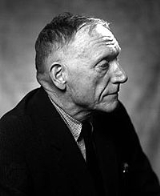
. He was also a charter member of the Fellowship of Southern Writers
. He founded the influential literary journal The Southern Review with Cleanth Brooks
in 1935. He received the 1947 Pulitzer Prize for the Novel for his novel All the King's Men
(1946) and the Pulitzer Prize for Poetry
in 1958 and 1979. He is the only person to have won Pulitzer Prizes for both fiction and poetry.
Warren was born in Guthrie, Kentucky
, which is very near the Tennessee-Kentucky border, to Robert Warren and Anna Penn.
The poet is in the end probably more afraid of the dogmatist who wants to extract the message from the poem and throw the poem away than he is of the sentimentalist who says, "Oh, just let me enjoy the poem." ![]()
For fire flames but in the heart of a colder fire. All voice is but echo caught from a sound-less voice. Height is not deprivation of valley, nor defect of desire. But defines, for the fortunate, that joy in which all joys should rejoice.![]()
The poem... is a little myth of man's capacity of making life meaningful. And in the end, the poem is not a thing we see — it is, rather, a light by which we may see — and what we see is life.![]()
Most writers are trying to find what they think or feel. . . not simply working from the given, but toward the given, saying the unsayable and steadily asking, "What do I really feel about this?" ![]()
The urge to write poetry is like having an itch. When the itch becomes annoying enough, you scratch it.![]()
Long ago, in Kentucky, I, a boy, stood By a dirt road, in first dark, and heard The great geese hoot northward. I could not see them, there being no moon And the stars sparse. I heard them.I did not know what was happening in my heart.![]()

